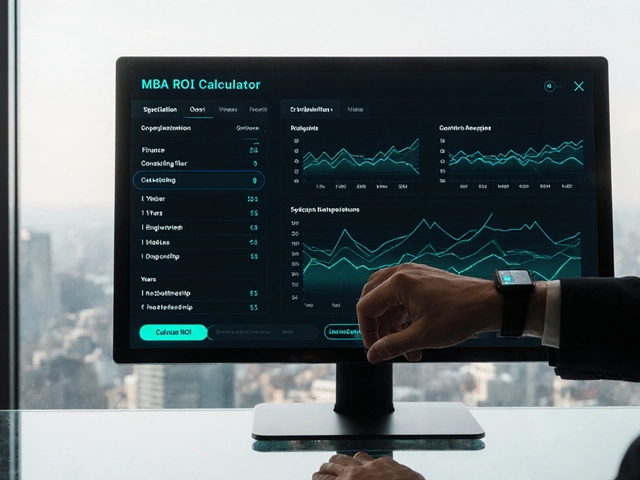
MBA vs Masters: Key Differences, Benefits, and Choosing the Right Path
When you hear friends or colleagues debating MBA vs Masters, the conversation can feel like a maze of acronyms, tuition fees, and career promises. You might wonder whether an MBA is just a fancier master’s, or if a regular master’s degree can open the same doors. This guide cuts through the noise, laying out the real distinctions, costs, admission hurdles, and outcomes so you can decide which credential aligns with your goals.
What an MBA is really means
An MBA (Master of Business Administration) is a graduate degree designed to develop leadership, strategic thinking, and managerial skills across all business functions. It originated in the early 20th century to give engineers a foothold in management. Today, MBAs are offered full‑time, part‑time, executive, and online, often with specializations like finance, marketing, or entrepreneurship.
What a generic Master’s Degree covers
A Master’s Degree is a post‑bachelor academic qualification focused on deepening knowledge in a specific discipline. It can be a Master of Science (MSc), Master of Arts (MA), or professional master like a Master of Engineering (MEng). Unlike the MBA, which is inherently business‑oriented, a master’s can be earned in fields ranging from computer science to public health, each with its own research or practice emphasis.
Core differences at a glance
- Focus: MBA programs blend strategy, finance, marketing, and operations for broad managerial competence. Master’s programs dive deep into a single subject area.
- Target audience: MBAs attract professionals with a few years of work experience aiming for leadership roles. Master’s students often include recent graduates or academics seeking subject‑matter expertise.
- Classroom style: MBAs rely on case studies, group projects, and networking events. Master’s courses lean toward lectures, labs, and research papers.
- Outcome: MBA graduates typically pursue managerial or executive positions. Master’s graduates may go into research, specialized technical roles, or continue toward a PhD.
Cost and duration comparison
| Attribute | MBA | Master’s (non‑business) |
|---|---|---|
| Typical program length | 1‑2 years (full‑time) / 2‑4 years (part‑time) | 1‑2 years (full‑time) / 2‑3 years (part‑time) |
| Average tuition (US) | $60,000‑$120,000 | $20,000‑$60,000 |
| Average salary 3 years post‑graduation | $110,000‑$150,000 | $70,000‑$100,000 (varies by field) |
| Typical work experience required | 2‑5 years (average) | None to 2 years (depends on program) |

Admissions requirements: What you need to bring
Both credentials demand academic transcripts, recommendation letters, and a statement of purpose, but the specifics differ.
- GMAT or GRE scores are standard for most MBAs. Many top programs also accept the GRE for non‑business master’s, but some fields (like engineering) may require subject‑specific tests.
- Work experience: MBA programs often list a minimum of two years, using it to fuel class discussions. Master’s programs may admit straight from undergraduate studies.
- Essay focus: MBA essays highlight leadership moments, career pivots, and why you need a business education. A master’s essay usually showcases academic interests and research goals.
- Interview: Almost all elite MBA programs conduct a personal interview to gauge fit and communication skills. Master’s interviews are less common and typically only for competitive programs.
Career outcomes and Career Advancement
Data from the Financial Times 2024 MBA ranking shows that MBA alumni see an average salary bump of 57% within three years. In contrast, a non‑business master’s can raise earnings by around 30% on average, depending on the sector.
Beyond raw numbers, an MBA provides a Alumni Network that spans continents and industries. This network often translates into mentorship, venture funding, and board‑room introductions-advantages harder to quantify but highly valuable for entrepreneurial paths.
Specializations also matter. An MBA with a focus on Finance can lead to roles in investment banking, private equity, or corporate finance, while a Master’s in Data Science opens doors to senior analyst or machine‑learning engineer positions.
Choosing the right path for you
Ask yourself these practical questions before you decide:
- What is my career goal? If you aim for a C‑suite or want to lead a business unit, the MBA’s leadership focus and network are hard to beat. If you desire a technical or research‑heavy role, a subject‑specific master’s is more appropriate.
- Do I have work experience? An MBA typically expects you to have real‑world insights to share. Without it, you might struggle to meet admission thresholds.
- Can I afford the tuition and time off? Consider opportunity cost. A two‑year full‑time MBA may mean $120,000 in tuition plus lost salary, while a master’s might require less financial sacrifice.
- How important is networking? MBA programs invest heavily in alumni events, career fairs, and guest lectures. Master’s programs may offer industry connections, but usually on a smaller scale.
Map your answers onto a simple decision tree: if you need broad business leadership, have 2‑5 years experience, and can invest financially, the MBA is the logical step. If you’re fresh out of undergrad, want deep technical mastery, or are constrained by budget, a master’s degree aligns better.

Financial aid and scholarships
Both pathways offer scholarships, but their sources differ. MBA candidates often receive merit‑based awards from the business school, corporate sponsorships, or veteran benefits. Master’s students may tap into research grants, departmental fellowships, or government loans. Investigate each school’s financial‑aid page early; many institutions match donor contributions for high‑achieving applicants.
Real‑world example: Alex’s decision
Alex, a 28‑year‑old software engineer with three years of dev‑ops experience, wanted to transition into product management. He researched an MBA with a technology focus versus a Master’s in Information Systems. The MBA offered a strong alumni network in product firms and a salary boost projected at $130k after graduation, but required $85k tuition and two years of full‑time study. The master’s cost $35k and could be completed part‑time while working, but salary uplift was modest at $95k. Alex chose the MBA after securing a corporate sponsorship, valuing the network and fast‑track to senior product roles.
FAQs
Frequently Asked Questions
Is an MBA considered a master’s degree?
Yes. An MBA is a type of master’s degree that specifically concentrates on business administration and management.
Can I do an MBA without work experience?
Most top‑ranked programs require at least two years of professional experience, but some schools offer accelerated MBA tracks for exceptional recent graduates.
Which degree leads to higher salaries?
On average, MBA graduates see a larger salary uplift (often 50‑60% higher) compared to most non‑business master’s degrees, though exact figures depend on industry, location, and prior experience.
Do I need to take the GMAT for a master’s program?
Not always. Many master’s programs accept the GRE, and some technical master’s rely on subject‑specific exams or waive standardized tests altogether for strong academic records.
Can I switch from a master’s to an MBA later?
Yes. Many professionals complete a master’s first and later enroll in an MBA, often leveraging their technical expertise to specialize in areas like technology management or entrepreneurship.
Ultimately, the right choice hinges on where you see yourself in five or ten years, how much time and money you can invest today, and which network will help you get there. Use the facts in this guide, match them to your personal goals, and you’ll walk into the decision room with confidence.






Write a comment